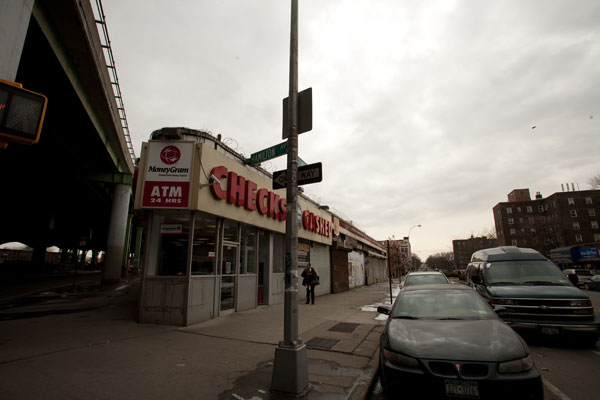
Colin Lenton
Above, a check-cashing outlet in Red Hook.
The article “Why are so Many New Yorkers Still Under-Banked” (01/06/17) should have been titled “How to Disseminate Misinformation about an Entire Industry and Get Away With It.”
The article has an aura of accuracy, without understanding the nuances of the subject, the financial climate pertaining to the issue, and the consumers that the article claims to speak on behalf of.
It is terribly wrong and misguided to lump and compare pawnshops, which are businesses with very little regulatory oversight (and which offer loans against items of value), with the check cashing industry – which has been since its statutory creation in 1944 one of the most highly regulated financial industries in the State of New York. In fact, New York’s check cashing industry is not involved in loans.
Where pawnbrokers are allowed to charge monthly rates of up to 25% and an additional service charge of 20%, check cashers are only allowed to charge a strictly enforced fee of 2.01% per check cashing transaction, as dictated by law.
Comparing pawnshops with check cashers is like comparing apples to cucumbers, and stating conclusions about their similarities. The lack of real understanding about the plight of economically distressed communities, the check cashing industry, and its vital role in local economies where the right to the most basic financial services has been historically denied, is deceitful to the reader and allows the author to describe check cashers as being responsible for predatory activities – which in reality is completely false.
This is most blatant when the article utilizes the label “Predatory Financial Services” when describing services provided by check cashers. The article fails to clearly indicate that check cashers in New York do not provide payday loans and their Association (FSCNY) has in fact publicly criticized such loan products. And yet the article saddles the entire industry with this predatory practice, which is illegal in our state.
And if that wasn’t enough, the author, in mentioning last year’s check casher’s supported “Omnibus Bill”, mistakenly states that the industry sought to provide loans to individuals, when in reality the legislation requested authorization for business lending only, and at the same competitive interest rates that banks are allowed by law to charge.
The 1994 “NYS Omnibus Consumer Protection and Bank Regulation Act” has failed, because banks have no incentive, nor accountability, to pursue low-income customers. At this moment in history, allowing for an expanded role for check cashing establishments (now called Financial Service Centers) is essential to help rectify New York’s still massive financial service access inequality and injustice.
Your article was a wasted opportunity to help demystify misguided perceptions about the check cashing industry, and the realities of New York’s un- and under-banked population in the 21st Century. The reality: modern commercial banking trends have reduced access to financial services for low-income customers, and in some cases, have entirely pushed out low-income individuals. High and hidden fees, and unaffordable balance requirements for customers who live paycheck-to-paycheck, have often made commercial banking not an option for the most financially vulnerable populations.
As Writer, Economist and Professor of City & Regional Planning at the University of Pennsylvania, Lisa Servon, accurately states in her book “The Unbanking of America: How The Middle Class Survives”, check cashing services are the preferred and in certain instances only, financial service alternative in un- and under-banked communities due to state-mandated and enforced low fees, immediate access to the most basic services that are essential to survive in the modern economy, and the absence of hidden fees. Her argument is based on research and also her own experiences as an undercover employee of a check cashing store in the South Bronx.
Your article could have benefited from the same accurate and serious reporting that Professor Servon brought to her book, rather than demonizing an entire industry, and lumping it with another type of business, that is entirely disconnected.
Andrew Siegel is the president of Financial Service Centers of New York
Editor’s Response: The point of our article was to challenge traditional banks for the very failures to which Mr. Siegel’s op-ed alludes. A careful reading of our story will reveal that, contrary to the assertions above, it does not lump pawnshops and check-cashing outlets together (except to accurately describe them as alternative financial services), states clearly the different interest-rate regulations under which each industry operates, never describes check-cashing businesses as predatory and never claims that they currently offer loans.
As far as last year’s omnibus bill is concerned, the article correctly indicates the suspicion that while ostensibly written to allow loans only to small businesses, loans to individuals could effectively be permitted because many small businesses are one-person or one-household operations. As columnist Errol Louis wrote in the Daily News last year: “The reality is that many neighborhood businesses are family-owned sole proprietorships, meaning a lot of the loans would be going to individuals, opening a side door to more personal lending by check cashers on God only knows what terms.”
City Limits has in the past acknowledged that check-cashing outlets play a nuanced role in low-income neighborhoods. (See our work in 2010 and 2011). Our reporting on the topic, which itself is just as nuanced, shall continue.









One thought on “CityViews: Check-Cashing Industry Takes Issue With our Reporting on the Un-Banked”
A “nuanced role in low-income neighborhoods”. Compared to banks, check cashing stores have longer hours of operation, (many are 24/7), better accessibility, a far wider range of products and services and fees that are clearly posted. Far from “subtle differences”!